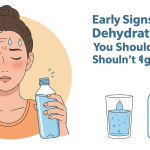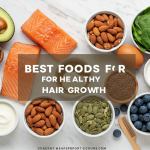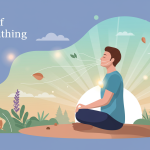Your eyes are among your most precious organs, allowing you to see and experience the world. But in our modern lives—filled with screens, pollution, and busy routines—eye health is often neglected. Thankfully, it doesn’t take much to keep your eyes healthy. Just a few simple habits can help you maintain clear vision and prevent common problems.
Here are the best practical tips to protect and improve your eye health every day.
Read More: How to Improve Mental Health Naturally

✅ 1. Eat a Nutrient-Rich Diet
A healthy diet is the foundation of good vision. Nutrients like vitamin A, vitamin C, vitamin E, zinc, and omega-3 fatty acids play a crucial role in keeping your eyes functioning properly.
Foods to include in your diet:
Carrots & Sweet Potatoes: Rich in beta-carotene, which converts to vitamin A and helps prevent night blindness.
Leafy Greens: Spinach, kale, and collards are high in lutein and zeaxanthin, antioxidants that protect against cataracts and age-related macular degeneration.
Fatty Fish: Salmon, mackerel, and tuna provide omega-3s that support the retina and reduce dry eye syndrome.
Nuts and Seeds: Almonds, walnuts, and chia seeds are excellent sources of vitamin E.
Citrus Fruits: Oranges and lemons are packed with vitamin C to strengthen blood vessels in your eyes.
✅ 2. Follow the 20-20-20 Rule
Digital eye strain is becoming increasingly common due to prolonged screen use. To reduce eye fatigue:
Every 20 minutes, look away from your screen and focus on an object 20 feet away for 20 seconds.
This simple habit relaxes your eye muscles and prevents strain.
✅ 3. Wear Sunglasses Outdoors
Sun exposure isn’t just harmful to your skin—it can also damage your eyes. Over time, ultraviolet (UV) rays increase the risk of cataracts, macular degeneration, and growths on the eye surface.
Tip: Choose sunglasses that block 100% UVA and UVB rays. Wraparound styles offer extra protection.
✅ 4. Keep Your Eyes and Hands Clean
Infections like conjunctivitis (pink eye) often spread through dirty hands. Always wash your hands before touching your eyes or handling contact lenses. Replace lenses as recommended by your eye care professional.
✅ 5. Stay Hydrated
Drinking enough water is essential for maintaining healthy tear production and preventing dry eyes. Aim for 6–8 glasses of water a day.

✅ 6. Get Regular Eye Exams
Even if you don’t wear glasses, an eye exam every 1–2 years can help detect issues early. Eye doctors can spot signs of glaucoma, diabetic retinopathy, or other problems before symptoms appear.
If you have risk factors (like diabetes or a family history of eye disease), you may need more frequent check-ups.
✅ 7. Rest Your Eyes
Give your eyes a break throughout the day—especially if you spend long hours reading or working on a computer.
How to rest your eyes:
Blink frequently to keep your eyes moist.
Adjust screen brightness to reduce glare.
Use artificial tears if your eyes feel dry.
✅ 8. Quit Smoking
Smoking significantly increases the risk of eye diseases, including:
Quitting smoking not only improves your eye health but also benefits your entire body.
✅ 9. Use Proper Lighting
Poor lighting can strain your eyes and lead to headaches. When reading or working:
Use a desk lamp with a soft light.
Avoid glare by positioning your light behind you and directing it onto your work surface.
Adjust your computer screen to reduce reflections.
✅ 10. Protect Your Eyes During Activities
Whether you’re working in the yard, playing sports, or handling chemicals, always wear appropriate protective eyewear.
Safety goggles or glasses can prevent injuries that could damage your vision permanently.
✅ Conclusion: Healthy Habits for Clear Vision
Your eyes deserve care and attention every day. Small, simple actions—like eating nutritious foods, wearing sunglasses, taking screen breaks, and scheduling regular check-ups—can keep your vision sharp and your eyes comfortable for years to come.
At Knowledge Galaxy, we believe that protecting your sight starts with informed choices. Begin today with these easy tips—and see the difference for yourself.

1. How often should I get my eyes checked?
Most adults should have an eye exam every 1–2 years. If you have vision problems or health conditions like diabetes, ask your doctor how often to come in.
2. Can diet really help my vision?
Yes! Nutrients like vitamin A, lutein, and omega-3 fatty acids are essential for eye health.
3. What causes dry eyes?
Dry environments, dehydration, long screen time, and some medications can reduce tear production.
4. Are blue light glasses helpful?
Some people find relief from eye strain with blue light-filtering lenses, but taking regular screen breaks is the most effective solution.
5. When should I see a doctor?
If you experience sudden vision loss, eye pain, flashes of light, or severe redness, seek medical help immediately.










